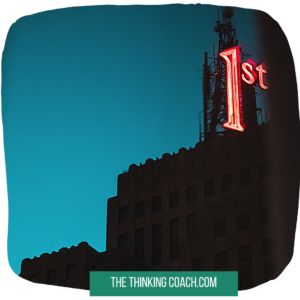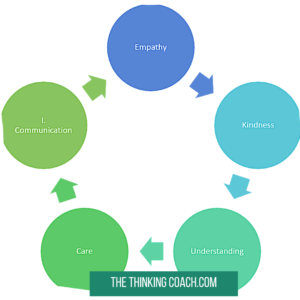Table of Contents
What is the significance of Emotional Intelligence in leadership?
Emotional intelligence in leadership is one of the most important skills of Situational leadership and the most underrated of all leadership skills.
This leadership skill is a game-changer in that it enables leaders to build trust within their organization and bridge the ever-growing disconnect between leadership and the workforce.
Leadership and emotional intelligence must be a “couple” that is always together and one that brings others together.
Emotional intelligence in leadership should be regarded as one of the main skills that situational leadership possesses in creating cohesive teams and togetherness in the workplace.
The main expressions, or symptoms of the presence of this “couple”, leadership and emotional intelligence, are empathy, kindness, forbearance, understanding, and care, and powerful interpersonal communication.
The Nature Of the Times

We live in an age where collaboration and teamwork have a high premium, which seems to be a theme of the millennials, and Gen Z who are all about togetherness and comradery.
Therefore, situational leadership of collaboration while creating a healthy work environment where people can thrive is a critical strategic long-term strategy, in which, the skill of emotional intelligence in leadership is primal.
Leadership and emotional intelligence form a business synergy that focuses on being a people person and acknowledging their immense importance to the success of the organization, which is what the younger generations yearn for.
It causes cohesion and naturally promotes people to take ownership, reduces the volatility of employee turnover, and increases morale.
So it’s a good idea to take serious note of what emotional intelligence in leadership is about and to strategically incorporate it into the daily situational leadership training and practices.
5 Critical Tips About Emotional Intelligence in Leadership
Tip 1- EQ and IQ – a Complimentary Pair
Intelligent emotions empower mental intelligence and vice-versa.
The more a leader focuses on understanding people’s emotions and “pressing the right buttons” in them, the more intelligent they become about their function as a situational leader.
leadership is a function after all isn’t it? Of course, it is! It is about being worthy of other people where the skill of emotional intelligence in leadership makes it so.
Without leadership and emotional intelligence “walking together” a leader never has the humility or the aptitude to see and accept the bigger picture.
Now, the perception of the big picture always reveals current needs, which is exactly what defines healthy situational leadership. One that caters to the current needs of the situation and not to its own.
As an aside, emotional intelligence in leadership make the leader far more intelligent in their decision making and in their ability to think out of the box.
As a further aside, such style of leadership will be durable, stable, and will last much longer than without the presence of emotional intelligence in leadership, because they will be empowered by the people they lead.
Emotional intelligence in leadership could be defined as the ability to chose emotions that facilitate mental intelligence and the overall intelligence of those that you, the leader, deal with.
Tip 2 – Looking at Leadership and Emotional Intelligence Through The Eyes of the Power of Positive Thinking
To have emotional intelligence in leadership a leader needs to be smart enough to make conscious choices of which emotions to bring to the table in the running of their organization.
There are all kinds of emotions so the choice of which ones is key.
Intelligent emotions belong to the family of positive thinking, while Unintelligent emotions are part of the Negativity family.
To add to the mix to clarify the concept of Choice of emotions I must bring into the forming picture of leadership and emotional intelligence the notion of the power of positive thinking.
It is a power, whereas negativity takes away from power. So what is being written here is that emotional intelligence in leadership is a way to become a powerful leader.
The connection between leadership and emotional intelligence with the power of positive thinking 
- Emotional Intelligence and the power of positive thinking are interchangeable.
- It is a range of positive feelings and emotions between two or more people with the idea in mind of improvement and win-win collaboration and building a cohesive team
- Emotional Intelligence is the intelligence that facilitates negotiation, selling, buying, speaking, leading, and many other actions that we regularly do in our lives.
- It’s an art of facilitating teamwork and an important strategic thinking component of teambuilding.
- Emotional Intelligence in leadership is a vital necessity for leaders to turn toxic negativity into positivity.
- Emotional intelligence in leadership should be a skill to FOCUS on in of leadership training, (it is a key feature of The Thinking Coach Leadership Seminars).
To put it clearly, Emotional Intelligence in leadership is about making the conscious choice to tap into the well of the power of positive thinking,
Tip 3 – The First Principle of Leadership
There is such a thing called “the first principle” of a domain, meaning this is the first most important thing, which must be considered in the manner of “never leave home without it”.
The domain of leadership is no different.
The first principle of leadership is to have a set of soft skills that exercises the manners of being humane.
Before anything else a leader needs to faithfully carry the burden that they need to be a leader that honors people.
Ooops, we just lost 90% of those people who call themselves leaders…and that is the truth, but let’s move on to those honest leaders…
Remember O leader, humans are not your toys or a commodity to trade with.
When you look at another person in the eyes you are dealing with God-created human beings, just as you are, and if you cannot take that fact seriously, stop! Resign! Find something else to do.
A leader that doesn’t respect people will find it difficult to lead and will have to deal with the fallout of disrespect, which is conflict, suspicion, fear, and all those things that make the workplace atmosphere toxic.
If however, you want to be a good leader, incorporate emotional intelligence in leadership and find a way to truly respect people.
The truth is that it must begin by truly respecting yourself and what created you. Only that will pave the way for you to respect others.
Tip 4 – Lead By Example
True leadership is by example. there’s no other way to think about it.
This fact should be understood by any person aspiring to be a leader. Otherwise, it makes a joke of the function of leadership, which is, unfortunately, the grim reality of our times.
Potential leaders take note; without acquiring and developing the skill of emotional intelligence in leadership you cannot lead by example.
You must create a connection between emotional intelligence and leadership in your own style of leadership while demonstrating (not talking about) values, standards, and ethics that can be felt and registered by the people you lead.
Tip 5 – The parameters of Emotional Intelligence In Leadership
Empathy, kindness, forbearance, understanding, care, and skillful interpersonal communication are the main keyways to emotional intelligence in leadership.
An encyclopedia could be written about them but for the sake of this article, they will be written about very briefly.
The genuine leader will take it much further in her or his leadership excellence quest.
- Empathy – the openness and ability to feel the pain and stress of another human and by that begin to relieve that stress and be there for them. Look at children and learn from them.
- Kindness and forbearance – these are twins that convey that you believe in people and you’ll put up with their genuine mistakes and be there for them.
- Understanding – you demonstrate an interest in the person by asking questions about their situation and avoid being shallow or general. You deal with them as unique human beings.
- Care – that is a quality that melts walls of distrust. It is a quality that is evident in the attention to small details where people are concerned. Show it, demonstrate it, live by it, because you CARE.
- Interpersonal communication – emotional intelligence in leadership has a particular style of interpersonal communication that uses carefully a choice of words, and more importantly, body language and tone of voice. It is a combination of intimacy and firmness that gives the other person the feeling that you are there for them. Active listening is a huge part of it.
Finally
If you love being a leader and want to lead by example, be empowered and respected by your people, make sure that you pay attention to the skill of emotional intelligence in leadership, and never take your eyes off the mark.
Read on to know what I can do for you to make sure you understand what added value I can bring to help you integrate leadership and emotional intelligence into your style of leadership.
What Can The Thinking Coach Leadership & Emotional Intelligence Seminars Do For You?
These seminars will show you the power of positive thinking through the skill of emotional intelligence in leadership.
It must be understood that an authentic leader needs to think strategically about leadership self-development where they gain the skills they would need to have to lead by example. Just having the title of a leader is simply not enough!
I will show you and train you how to effectively use Emotional intelligence in leadership as an effective tool that will redefine your Leadership style and transform it to a high level of situational leadership.
I hope you have enjoyed this article and should you have any questions or comments please write them below.
Eli Harari
The Life Coach for Professionals™
Image Source: Unsplash, Pexels


Pingback: 4 Ways How To Best Monetize Your Website? - The Thinking Coach
Pingback: 3 Effective Decision-Making Tips Using Emotional Intelligence - The Thinking Coach
Pingback: 10 Critical Decision-Making Skills